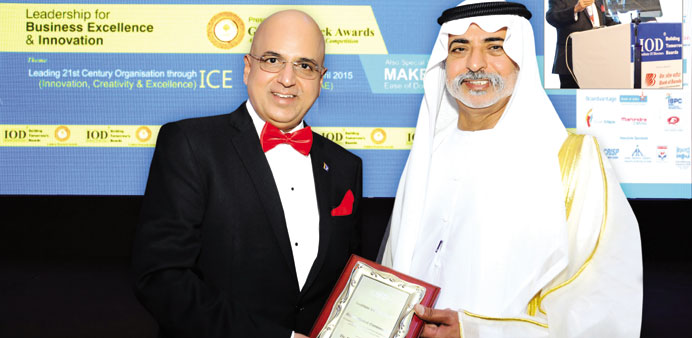Seetharaman receiving a citation from Sheikh Nahyan.
The Institute of Directors (IOD) has bestowed a plaque of recognition to Doha Bank Group CEO Dr R Seetharaman during the Dubai Global Convention 25th World Congress on Leadership for Business Excellence & Innovation held from April 20 to 22 at the Meydan Hotel in Dubai.
Seetharaman received the citation from UAE Minister of Culture, Youth, and Community Development Sheikh Nahyan bin Mubarak al-Nahyan. The event, which carried the theme “Leading 21st Century Organisation through Innovation, Creativity, & Excellence,” coincided with the presentation of the Golden Peacock Awards.
During the event, Seetharaman presented a topic entitled “Changing Global Economics & Financial Impact on Markets — Middle East Perspective.”
He said the recent International Monetary Fund (IMF) Outlook has revised the growth for GCC economies after the drop in oil prices. According to Seetharaman, Qatar’s economy is expected to grow at 7.1% in 2015. For the same period, Saudi Arabia’s economy is expected to grow at 3%, while the UAE expects a 3.2% growth.
He also said Kuwait’s economy is expected to grow at 1.7% and Oman at 4.6%, while Bahrain expects a 2.7% growth also for the same period. The GDP at current prices of GCC economies is expected to be above $1.43tn in 2015, Seetharaman noted.
“The recent IMF Outlook had forecasted a growth of 3.5% in 2015 and 3.8% in 2016. Global growth in 2015 will be driven by a rebound in advanced economies, expected to increase from 1.8% last year to 2.4% this year.
“After weak second and third quarters in 2014, growth in the euro area is showing signs of picking up. And after a disappointing 2014, a weaker yen and lower oil prices are expected to lead to a pickup of growth in Japan,” Seetharaman said. He said growth for emerging and developing economies is projected to slow down from 4.6% in 2014 to 4.3% in 2015.
“The Chinese authorities’ emphasis is on reducing vulnerabilities from recent rapid credit and investment growth. Brazil’s outlook is also affected by a drought, tighter macroeconomic policies, and weak private sector sentiment,” he said.
Seetharaman said, “Saudi Arabia recently announced it is going to open its stock market to direct foreign investment in mid-June, allowing qualified foreign institutions to buy shares.
“Saudi Arabia’s market was up by more than 3% on Sunday on account of this. This year, GCC capital markets have been volatile on account of low levels in oil prices. WTI was $55.74 per barrel and Brent Crude was at $63.45 per barrel by end of last week.”
Seetharaman stressed that “the low oil prices will have a bearing on the liquidity, economic growth, and the first quarter performance in GCC. Till April 19, 2015, the year-to-date performance of GCC markets was Qatar, (-) 3.2%; Dubai, 6.6%; Abu Dhabi, 2.1%; Saudi Arabia, 15.1%; Oman, (-) 0.8%; Kuwait, (-) 3%: and Bahrain, (-) 2.4%.”
“The global growth is uneven; liquidity issues have been fixed. However, challenges to solvency and sustainability still remain. At the GCC level, the falling oil price has contributed to liquidity challenge and volatile capital markets. On account of falling oil prices, we are bracing for a volatile situation this year,” Seetharaman said.

